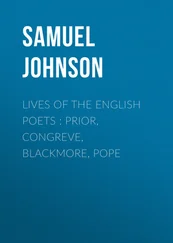Samuel Johnson - Johnson's Lives of the Poets. Volume 2
Здесь есть возможность читать онлайн «Samuel Johnson - Johnson's Lives of the Poets. Volume 2» — ознакомительный отрывок электронной книги совершенно бесплатно, а после прочтения отрывка купить полную версию. В некоторых случаях можно слушать аудио, скачать через торрент в формате fb2 и присутствует краткое содержание. Издательство: Иностранный паблик, Жанр: foreign_poetry, literature_18, Поэзия, foreign_antique, foreign_prose, на английском языке. Описание произведения, (предисловие) а так же отзывы посетителей доступны на портале библиотеки ЛибКат.
- Название:Johnson's Lives of the Poets. Volume 2
- Автор:
- Издательство:Иностранный паблик
- Жанр:
- Год:неизвестен
- ISBN:нет данных
- Рейтинг книги:5 / 5. Голосов: 1
-
Избранное:Добавить в избранное
- Отзывы:
-
Ваша оценка:
- 100
- 1
- 2
- 3
- 4
- 5
Johnson's Lives of the Poets. Volume 2: краткое содержание, описание и аннотация
Предлагаем к чтению аннотацию, описание, краткое содержание или предисловие (зависит от того, что написал сам автор книги «Johnson's Lives of the Poets. Volume 2»). Если вы не нашли необходимую информацию о книге — напишите в комментариях, мы постараемся отыскать её.
Johnson's Lives of the Poets. Volume 2 — читать онлайн ознакомительный отрывок
Ниже представлен текст книги, разбитый по страницам. Система сохранения места последней прочитанной страницы, позволяет с удобством читать онлайн бесплатно книгу «Johnson's Lives of the Poets. Volume 2», без необходимости каждый раз заново искать на чём Вы остановились. Поставьте закладку, и сможете в любой момент перейти на страницу, на которой закончили чтение.
Интервал:
Закладка:
The version of Lucan is one of the greatest productions of English poetry, for there is perhaps none that so completely exhibits the genius and spirit of the original. Lucan is distinguished by a kind of dictatorial or philosophic dignity, rather, as Quintilian observes, declamatory than poetical; full of ambitious morality and pointed sentences, comprised in vigorous and animated lines. This character Rowe has very diligently and successfully preserved. His versification, which is such as his contemporaries practised, without any attempt at innovation or improvement, seldom wants either melody or force. His author's sense is sometimes a little diluted by additional infusions, and sometimes weakened by too much expansion. But such faults are to be expected in all translations, from the constraint of measures and dissimilitude of languages. The "Pharsalia" of Rowe deserves more notice than it obtains, and as it is more read will be more esteemed.
GAY
John Gay, descended from an old family that had been long in possession of the manor of Goldworthy, in Devonshire, was born in 1688, at or near Barnstaple, where he was educated by Mr. Luck, who taught the school of that town with good reputation, and, a little before he retired from it, published a volume of Latin and English verses. Under such a master he was likely to form a taste for poetry. Being born without prospect of hereditary riches, he was sent to London in his youth, and placed apprentice with a silk mercer. How long he continued behind the counter, or with what degree of softness and dexterity he received and accommodated the ladies, as he probably took no delight in telling it, is not known. The report is that he was soon weary of either the restraint or servility of his occupation, and easily persuaded his master to discharge him.
The Duchess of Monmouth, remarkable for inflexible perseverance in her demand to be treated as a princess, in 1712 took Gay into her service as secretary: by quitting a shop for such service he might gain leisure, but he certainly advanced little in the boast of independence. Of his leisure he made so good use that he published next year a poem on "Rural Sports," and inscribed it to Mr. Pope, who was then rising fast into reputation. Pope was pleased with the honour, and when he became acquainted with Gay, found such attractions in his manners and conversation that he seems to have received him into his inmost confidence; and a friendship was formed between them which lasted to their separation by death, without any known abatement on either part. Gay was the general favourite of the whole association of wits; but they regarded him as a playfellow rather than a partner, and treated him with more fondness than respect.
Next year he published "The Shepherd's Week," six English pastorals, in which the images are drawn from real life, such as it appears among the rustics in parts of England remote from London. Steele, in some papers of the Guardian, had praised Ambrose Philips as the pastoral writer that yielded only to Theocritus, Virgil, and Spenser. Pope, who had also published pastorals, not pleased to be overlooked, drew up a comparison of his own compositions with those of Philips, in which he covertly gave himself the preference, while he seemed to disown it. Not content with this, he is supposed to have incited Gay to write "The Shepherd's Week," to show that, if it be necessary to copy nature with minuteness, rural life must be exhibited such as grossness and ignorance have made it. So far the plan was reasonable; but the pastorals are introduced by a Proeme, written with such imitation as they could attain of obsolete language, and, by consequence, in a style that was never spoken nor written in any language or in any place. But the effect of reality and truth became conspicuous, even when the intention was to show them grovelling and degraded. These pastorals became popular, and were read with delight as just representations of rural manners and occupations by those who had no interest in the rivalry of the poets, nor knowledge of the critical dispute.
In 1713 he brought a comedy called The Wife of Bath upon the stage, but it received no applause; he printed it, however, and seventeen years after, having altered it and, as he thought, adapted it more to the public taste, he offered it again to the town; but, though he was flushed with the success of the Beggar's Opera, had the mortification to see it again rejected.
In the last year of Queen Anne's life Gay was made secretary to the Earl of Clarendon, Ambassador to the Court of Hanover. This was a station that naturally gave him hopes of kindness from every party; but the Queen's death put an end to her favours, and he had dedicated his "Shepherd's Week" to Bolingbroke, which Swift considered as the crime that obstructed all kindness from the House of Hanover. He did not, however, omit to improve the right which his office had given him to the notice of the Royal Family. On the arrival of the Princess of Wales he wrote a poem, and obtained so much favour that both the Prince and the Princess went to see his What D'ye Call It, a kind of mock tragedy, in which the images were comic and the action grave; so that, as Pope relates, Mr. Cromwell, who could not hear what was said, was at a loss how to reconcile the laughter of the audience with the solemnity of the scene.
Of this performance the value certainly is but little; but it was one of the lucky trifles that give pleasure by novelty, and was so much favoured by the audience that envy appeared against it in the form of criticism; and Griffin, a player, in conjunction with Mr. Theobald, a man afterwards more remarkable, produced a pamphlet called "The Key to the What D'ye Call It," "which," says Gay, "calls me a blockhead, and Mr. Pope a knave."
But fortune has always been inconstant. Not long afterwards (1717) he endeavoured to entertain the town with Three Hours after Marriage, a comedy written, as there is sufficient reason for believing, by the joint assistance of Pope and Arbuthnot. One purpose of it was to bring into contempt Dr. Woodward, the fossilist, a man not really or justly contemptible. It had the fate which such outrages deserve. The scene in which Woodward was directly and apparently ridiculed, by the introduction of a mummy and a crocodile, disgusted the audience, and the performance was driven off the stage with general condemnation.
Gay is represented as a man easily incited to hope, and deeply depressed when his hopes were disappointed. This is not the character of a hero, but it may naturally imply something more generally welcome, a soft and civil companion. Whoever is apt to hope good from others is diligent to please them; but he that believes his powers strong enough to force their own way, commonly tries only to please himself. He had been simple enough to imagine that those who laughed at the What D'ye Call It would raise the fortune of its author, and, finding nothing done, sunk into dejection. His friends endeavoured to divert him. The Earl of Burlington sent him (1716) into Devonshire, the year after Mr. Pulteney took him to Aix, and in the following year Lord Harcourt invited him to his seat, where, during his visit, two rural lovers were killed with lightning, as is particularly told in Pope's "Letters."
Being now generally known, he published (1720) his poems by subscription, with such success that he raised a thousand pounds, and called his friends to a consultation what use might be best made of it. Lewis, the steward of Lord Oxford, advised him to intrust it to the Funds, and live upon the interest; Arbuthnot bade him to intrust it to Providence, and live upon the principal; Pope directed him, and was seconded by Swift, to purchase an annuity.
Gay in that disastrous year had a present from young Craggs of some South Sea Stock, and once supposed himself to be master of twenty thousand pounds. His friends persuaded him to sell his share; but he dreamed of dignity and splendour, and could not bear to obstruct his own fortune. He was then importuned to sell as much as would purchase a hundred a year for life, "which," says Penton, "will make you sure of a clean shirt and a shoulder of mutton every day." This counsel was rejected; the profit and principal were lost, and Gay sunk under the calamity so low that his life became in danger. By the care of his friends, among whom Pope appears to have shown particular tenderness, his health was restored; and, returning to his studies, he wrote a tragedy called The Captives, which he was invited to read before the Princess of Wales. When the hour came, he saw the Princess and her ladies all in expectation, and, advancing with reverence too great for any other attention, stumbled at a stool, and, falling forwards, threw down a weighty Japan screen. The Princess started, the ladies screamed, and poor Gay, after all the disturbance, was still to read his play.
Читать дальшеИнтервал:
Закладка:
Похожие книги на «Johnson's Lives of the Poets. Volume 2»
Представляем Вашему вниманию похожие книги на «Johnson's Lives of the Poets. Volume 2» списком для выбора. Мы отобрали схожую по названию и смыслу литературу в надежде предоставить читателям больше вариантов отыскать новые, интересные, ещё непрочитанные произведения.
Обсуждение, отзывы о книге «Johnson's Lives of the Poets. Volume 2» и просто собственные мнения читателей. Оставьте ваши комментарии, напишите, что Вы думаете о произведении, его смысле или главных героях. Укажите что конкретно понравилось, а что нет, и почему Вы так считаете.












